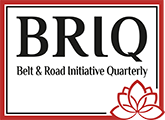EDITORIAL
The BRI and the Organization of Turkic States in a Multipolar World
One might argue that a defining characteristic of the multipolar world is the rise of regional cooperation platforms that are increasingly gaining strength and extending their influence from the regional to the global level. Certainly, regional organizations where countries convened based on economic, political, or military ties existed even prior to the onset of multipolarity. However, it is widely recognized that during this period, Atlantic hegemonism was capable of steering these organizations, either through direct involvement or via proxy states. In contrast, the current decline in Atlantic supremacy, particularly in the realms of economics and high technology, has fostered an environment that has contributed to the retreat of hegemonism. This new multipolar context has paved the way for regional cooperation platforms that enable developing nations to more effectively pursue their own interests. On a global scale, organizations such as BRICS, the Shanghai Cooperation Organization (SCO)—which extends not only across Asia but also reaches Europe via Belarus—alongside the Bolivarian Alliance for the Peoples of Our America (ALBA) and the Union of South American Nations (UNASUR) in Latin America, and more recently the Sahel States Alliance in Africa, have gained significant momentum. Concurrently, earlier regional platforms, as they increasingly extricate themselves from hegemonic dominance, have provided nations within these regions with the opportunity to focus on their own interests. The establishment of the Organization of Turkic States (OTS) in 2019 is a further development that has emerged within the framework of a multipolar world.
At the present time, the nation-states of Asia, Africa, and Latin America find themselves objectively positioned in opposition to the US-led Atlantic front, within the broader context of the global confrontation that has emerged. In this global struggle, the Atlantic bloc’s most significant objective is to halt the rise of Asia, a rise that plays a pivotal role in undermining global hegemony. In this endeavor, two critical focal areas have emerged: West Asia and Central Asia. Conversely, both regions hold strategic importance for the Belt and Road Initiative (BRI), a multilateral cooperation platform proposed by China that seeks to foster shared development and prosperity among developing nations.
As the BRI approaches its 11th anniversary, it is evident that the transportation and energy corridors under this initiative will traverse the member states of the OTS in this region. The effective participation of the OTS and its members within the BRI holds the potential to precipitate significant shifts on the international stage.
Türkiye, alongside the Turkic republics of Central Asia, aligns itself within both the SCO, where it holds Dialogue Partner status, and the OTS. These republics also maintain partnerships with Russia, China, Iran, and India within the SCO, cooperate with Russia through the Collective Security Treaty Organization and the Eurasian Economic Union, and collaborate with China within the framework of the BRI.
Türkiye, which is both a target of the Atlantic bloc and a state it seeks to retain as an ally, finds its fate increasingly intertwined with that of Russia, China, and Iran—not only in economic matters but also in international politics. This alignment has the potential to transform the OTS into a bridge within Asia. Strengthening the OTS through policies that are aligned with the interests of regional states would further weaken Atlantic hegemonism. Consequently, this would not only bolster Türkiye’s position but also enhance the strategic standing of Russia, China, and Iran. This potential will be realized by making the OTS an organization that is embraced by all the nations of Asia that share a common destiny.
FİKRET AKFIRAT
Editor-in-Chief
